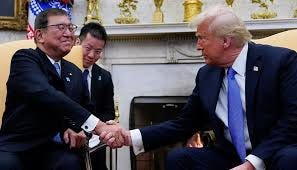Trump Study Sessions': How Japan PM's Homework Paid Off in Washington
Japan’s Prime Minister Shigeru Ishiba had an important mission when he met with US President Donald Trump at the White House: ensure Japan’s relationship with the US remains solid amidst the unstable Asia-Pacific region.
Unlike many high-profile international meetings involving Trump, this one was relatively smooth and diplomatic. Prime Minister Ishiba’s preparation was key. He held “study sessions” with his staff, consulted former Prime Minister Fumio Kishida, and even got advice from the widow of late Prime Minister Shinzo Abe, who had a close relationship with Trump.
The meeting avoided controversial moments, and both leaders focused on trade and defense cooperation, ushering in a new “golden era” of Japan-US relations. Ishiba pledged that Japan would increase investment in the US to $1 trillion, boost imports of US liquefied natural gas (LNG), and further expand trade relations, all of which aligned with Trump’s priorities.
However, Ishiba’s visit was not just about securing economic ties; it was a personal win for him amid political struggles back home. His government's position was weakened after October’s election loss, and he needed to bolster his international standing.
Ishiba, a former defense minister, followed a simple yet effective approach for diplomacy: keep things concise, avoid confrontation, and make personal flattery a key strategy. This new "Trump strategy" appeared to work well, despite the underlying tensions Japan faces regarding issues like trade wars and China’s growing influence.
This meeting reinforced Japan’s role as America's steadfast ally, steering clear of potential disagreements and keeping focus on economic and defense collaboration. Japan’s response to the US-China trade tensions and other global conflicts shows how Tokyo is carefully navigating its position without falling into any contentious situations.
With a balanced strategy, Japan’s diplomatic ties with the US appear to have emerged stronger, positioning Ishiba for a much-needed political win on the international stage
.



